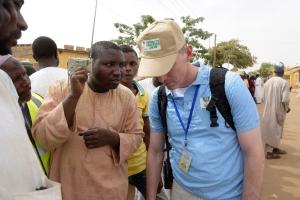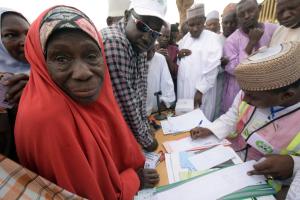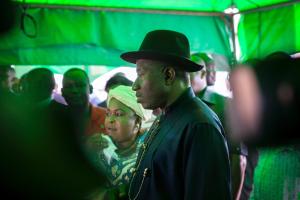Nigerian voters try again after technical glitches
Women in khimars wait in line to cast their votes at a polling staion in Daura, Katsina State, during presidential elections on March 28, 2015 (AFP Photo/Pius Utomi Ekpei)
Abuja (AFP) - Nigeria's closely fought general elections were forced into a second day on Sunday after failures in controversial new technology snarled the polling, including for President Goodluck Jonathan.
Authorities reopened some 300 polling stations -- of a total 150,000 -- where devices to read biometric voter identity cards did not work properly on Saturday.
Jonathan's ruling Peoples Democratic Party (PDP) has opposed the use of the technology, saying it was insufficiently tested, while the main opposition backs the new system as a way of curbing electoral fraud.
The president's campaign spokesman Femi Fani-Kayode late Saturday called for the resignation of Independent National Electoral Commission (INEC) chairman Attahiru Jega.
But Jega played down the problems, apologising for failures but insisting that the overall process had gone well.
"Regrettably there have been challenges. There were still cases of late distribution of materials and late arrival (of officials) in polling units," he told Channels television in an interview.
View gallery

A voter listening to the news on a radio set speaks to a foreign election observer near a polling st …
"From our general assessment, out of the 150,000 card readers which we have deployed, only about 450 were affected."
On Sunday the devices will be used again or voters will be processed manually in case of further glitches so that all citizens can exercise their democratic right, he added.
"It will not affect returns on (the) presidential election," he said.
- 'National embarrassment' -
Jonathan, 57, was eventually able to vote in his hometown of Otuoke, in southern Bayelsa state, but the problems did not affect his main challenger Muhammadu Buhari.
View gallery

An elderly woman waits in line to vote at a polling station in Daura, Katsina State, during presiden …
"All this... negative thought about Nigeria election shouldn't hold because of (a) problem in even a maximum of five states," the 72-year-old former military ruler said.
A 24-hour extension to the election was "in order", Buhari added after voting in his home state of Katsina, in the Muslim-majority north.
The PDP has called the problems "a huge national embarrassment" but Buhari's All Progressives Congress (APC) maintains that card readers should still be used as much as possible on Sunday.
To do so would "enhance the integrity of the process", party spokesman Lai Mohammed said in a statement late Saturday.
INEC spokesman Kayode Idowu said there were "about 109 places where cards were not read. Barely 100 places with biometrics issue and others had issue with batteries".
View gallery

Incumbent Nigerian president Goodluck Jonathan arrives to cast his ballot during presidential electi …
The row, which could be grounds for a legal challenge from either side, reflects the high stakes in the election, with Jonathan and Buhari running neck-and-neck in opinion polls.
The PDP, in power for all of the 16 years since Nigeria returned to civilian rule, has never faced a serious opposition challenge before now.
But the APC and Buhari have apparently gained support by attacking Jonathan's record in tackling the Boko Haram insurgency, endemic government corruption and a slump in the economy.
- Security issues -
Boko Haram, after dominating the campaign trail, has also loomed large in the vote, apparently honouring their pledge to disrupt what it sees as the "un-Islamic" elections by launching a series of attacks.
On Friday, 23 people were beheaded and homes were set on fire in Buratai, some 200 kilometres (125 miles) from the Borno state capital, although the attacks were not clearly related to the elections.
On Saturday, at least seven people were killed in a string of shootings that witnesses blamed on the Islamists in the northeastern state of Gombe. Three of the attacks were at polling stations.
An election official in the Nafada district, who asked not to be identified, said the gunmen were heard shouting: "Didn't we warn you about staying away from the election?"
The Islamists have repeatedly targeted Nafada but the APC blamed its political opponents.
Nigeria's most senior police officer, Suleiman Abba, said a number of sporadic incidents of poll-related violence were reported on Saturday and security would be maintained on Sunday.
Vote tallying began late Saturday, but at many polling stations officials resorted to flashlights as night fell, hit by the power cuts that are endemic to Nigeria.
Results were expected to begin trickling in later on Sunday.